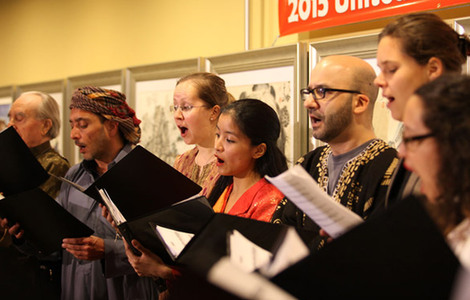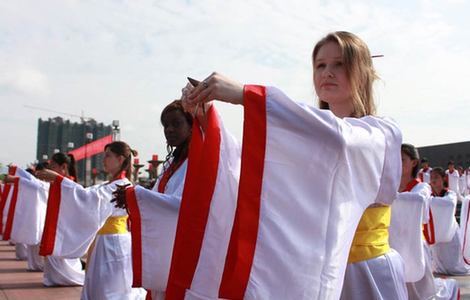Online China history course makes a world of difference in one life
Updated: 2015-04-22 11:44
By Chris Davis(China Daily USA)
|
|||||||||
Dave Pomerantz, 58, manages a software development group outside of Boston. He has a bachelor's in computer science from Princeton and an MBA from the Massachusetts Institute of Technology. He got interested in MOOCs - Massive Open Online Courses - in general because it was computer-assisted learning. He had always thought there had to be a better way to teach than the time-consuming paradigm of today's university learning.
"It takes so long for people to get an education," he said. "There must be some way to speed that up, some way to make the process more available to more people. And if people were able to do that - given the value of education - that could be one of the most significant developments of the 21st century."
MOOCs, along with biotech and computers, seemed to be a major step forward. So he wanted to try it out. He did a Stanford course on home finance with his wife and it was all right, but it inspired him to look around.
"I thought, what do I know the least about in this world and what do I want to learn something about? Chinese history. I knew nothing about Chinese history," he said. "A complete mystery to me."
He signed up for ChinaX, an 18-month course offered by Harvard University and "it just blew my socks off", he said.

Two professors guided the course and taught most of the 10 modules, or mini-courses - Peter Bol and Bill Kirby, with regular guest lecturers. The software platform for the course - EdX - was co-developed by Harvard and MIT.
Pomerantz went to the website, signed up, got a password, returned at the appointed hour, clicked the first heading under the first module - The Political and Intellectual Foundations of China: Dynasties - and was off and running.
The usual format was a series of videos followed by assessment questions, usually multiple-choice. You find out immediately after you've given the answer if you're right or wrong. There are also discussion questions where short essays are posted on a class forum and commented on.
"You're reading things written by people in China, in Sweden, Brazil, all over the world, not just Cambridge, Mass," he said. "And some of these people know an awful lot."
The videos were more than just the professors at a lectern; they were enhanced with images, graphics, Chinese lettering (lots of it) and other materials to help students visualize the events of the past. Some of the videos were even filmed in China during professors' trips there.
At the end of each module there was a final exam. Pass it and you get a certificate, "which is more or less meaningless, you can't use it for anything, it's more of a pat on the back", Pomerantz said.
Pomerantz heard that somewhere between 45,000 and 50,000 people had signed up for the class, though only a few thousand followed through and actually finished it.
Pomerantz was one of them, sticking with all 10 modules for a year and a half. Each module was between five and nine weeks. "There was a lot of material, 5,000 years of history," he said. "It seemed to me we covered a lot, because I don't know what I don't know."
"I learned the framework of what there is to know," Pomerantz said. What happened and why and how that shapes modern China, which he said is "one of the most important things to know".
To not understand the Warring States Period philosophers or how the civil service exam structured China's governance for two millennia is to not understand China today, he said.
"How superb the civil service exam was for selecting the elite to serve in government," he said. "In China, the people who ran the government were the smartest and the best and the brightest because they scored the highest in the civil service exam."
What did they test for? "Artistic skills, calligraphy, writing poetry, basically what we would consider today the liberal arts." And they used that to choose who ran the government.
Where else in the world has that happened? England, which had a civil service exam they took from China. "And we have a civil service exam that we got from England!" Another US-China connection revealed.
Pomerantz graciously made his notes available for this article. This writer's favorite item is called The Dynasty Song, wrapping 3,600 years of rulers into a children's round (to the tune of Frere Jacques):
Shang Zhou Qin Han
Shang Zhou Qin Han
Sui Tang Song
Sui Tang Song
Yuan Ming Qing Republic
Yuan Ming Qing Republic
Mao Zedong
Mao Zedong
Contact the writer at chrisdavis@chinadailyuse.com.
(China Daily USA 04/22/2015 page2)

 Weird stuff you can buy on Taobao
Weird stuff you can buy on Taobao
 Top 5 wealthiest women in world's tech sector
Top 5 wealthiest women in world's tech sector
 Outsiders challenge traditional smartphone makers
Outsiders challenge traditional smartphone makers
 Helicopter replica on the road
Helicopter replica on the road
 Chinese real estate deals in US topical forum
Chinese real estate deals in US topical forum
 Singing Chinese language's praises
Singing Chinese language's praises
 Foreign girls join in ancient Chinese coming-of-age ritual
Foreign girls join in ancient Chinese coming-of-age ritual
 Shanghai auto show kicks off
Shanghai auto show kicks off
Most Viewed
Editor's Picks

|

|

|

|

|

|
Today's Top News
Obama submits nuclear energy cooperation deal with China
US urges Japan to handle wartime history in constructive way
Mexico bans poultry, egg imports from bird flu-hit Iowa
Bloomberg: Chinese investment sustains US cities
Bloomberg: Chinese investment sustains US cities
China, Pakistan elevate ties, commit to long-lasting friendship
'Belt-Road' to exchange goodwill with economic coopertation
Swarm of Chinese applications deplete US investor visas
US Weekly

|

|







